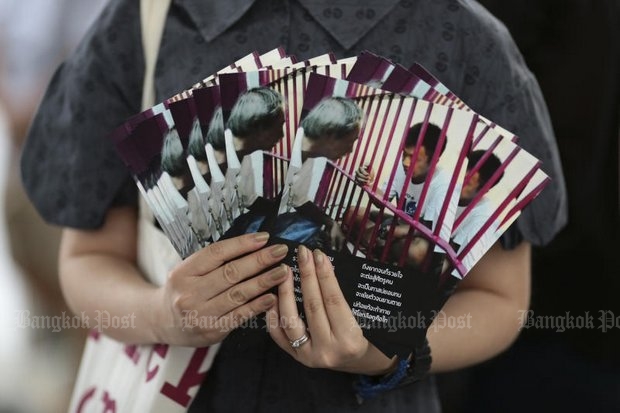
In the eyes of the state, Jatupat Boonpattararaksa aka "Pai Dao Din" is a kind of enfant terrible -- a young lad who often asks difficult questions that the authorities find too embarrassing. His political activism constantly puts him in trouble.
The 25-year-old student does not have a distinguished academic record. Yet, his childhood was a lively and meaningful one. Something that shaped him as he is today. It explains his unwavering courage in asking politically incorrect questions.
Pai's father, Viboon, grew up in a middle-class family. He was a lawyer who moved from Bangkok to the Northeast where he helped poor villagers fight several social injustice cases. Several years ago, he was in a team led by human rights lawyer Thongbai Thongpao who helped the families of six people who were killed by influential people in Chaiyaphum. In one case, a local leader who hired gunmen to attack villagers who were mounting an anti-pollution campaign in Khon Kaen was brought to justice.
As a child, Pai often accompanied his father on work trips, and saw how the poor were suffering. He was sometimes frustrated with his father's voluntary work which meant he could not secure a steady income for the family.

Achara Ashayagachat is Senior News Reporter, Bangkok Post.
Yet, he followed in his father's footsteps, enrolling in the Faculty of Law at Khon Kaen University before getting involved in social activities with the Dao Din (star of the earth) group.
He devoted more time to being a student activist than others. With other group members, Pai travelled widely in the Northeast to educate and support villagers fighting to protect their community rights and local environment from megaprojects and land grabbers.
He was among anti-mining protesters in Loei. A picture of him pleading with the authorities not to break up a protest was widely shared. The Dao Din group was awarded an accolade from the National Human Rights Commission and Pai was the one who accepted the award.
While the National Council for Peace and Order was successfully silencing other pro-democracy activists with a series of strict measures against freedom of expression, Pai and his Dao Din colleagues stood up peacefully and flashed that three-finger anti-coup sign right in front of Prime Minister Prayut Chan-o-cha who was attending a function in Khon Kaen.
That was the beginning of his and Dao Din's troubles over the past two years.
But Pai did not stop questioning the junta. He joined other student activists elsewhere in forming the New Democracy Movement (NDM) to continue calling for democracy and elections.
Weeks ahead of the charter referendum in August last year, the NDM campaigned for free discussions to debate the pros and cons of the proposed constitution which was eventually adopted amidst a climate of fear.
Pai faced several criminal charges for his political defiance to try and restore freedom of expression and peaceful assembly and was bailed.
He ran into trouble again late last year for posting a BBC Thai article about the monarchy on his Facebook. This time, the Khon Kaen Provincial Court revoked his bail, and he has been detained for the past month.
As a journalist, I interviewed the student and his family several times and cannot help but admire their courage and fighting spirit.
As we celebrate Children's Day tomorrow, I can't think of another youth whose life has been so fascinating and inspiring. He is a role model for social activists.
What he has done is upset the powers-that-be, especially the prime minister who calls for Thai children to be good by being compliant, docile, and by sticking to the "12 core values". But I see irrelevancy, if not confusion about how our children can grow up and acquire a critical mind if they obediently follow leaders, without questioning them.
As a mother of two teenagers, I admit that orderliness and discipline are sometimes preferable than rebellious actions. Like any mother, I want my kids to be obedient. But at the same time, I think it's important that we let our kids acquire critical thought and the courage to question and challenge the authorities. Without these attributes, our children cannot grow up as active citizens -- a main factor in a democratic society.
